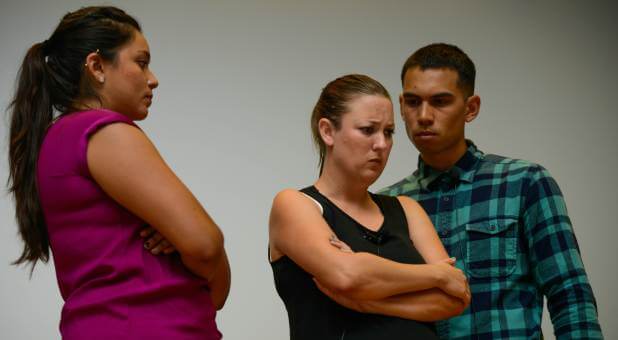Bible scholars and preachers have long emphasized how Jesus confronted the Pharisees and Sadducees, the “religious leaders” of His day, to bring Israel the news of God’s kingdom. For 21st-century followers of Messiah, that record needs correction.
Consider:
- The religious system of first century Israel was actually centered on temple sacrifice, the priests and Levites;
- The Pharisees and Sadducees, although religious men, were the legal system of their day;
- The Great Sanhedrin and the lesser Sanhedrin they ran were the high court and local courts of Israel;
- Torah, the Book of the Law, which instructed the conduct of the Jews, functioned much as the U.S. Constitution or the laws and statutes of our nations;
- They regularly interpreted or added to the law through their teachings and rulings;
- The Scriptures frequently describe them as “teachers of the Law” or “experts of the Law;”
- Jesus was called “Rabbi,” but he was not a synagogue leader. The English meaning of that word has changed. In Yeshua’s time, “rabbi” meant “teacher of the Law,” a counterpart to the modern-day law professor.
- Isaiah 6:9, which foretells Messiah as a newborn child, Prince of Peace and Mighty God includes the title “Wonderful Counselor.” Those words can properly be translated “extraordinary attorney” (the same Hebrew word for attorney, yaats, is used in Isaiah 1:26-27, where the context clearly supports that translation.
- Jesus functioned as a lawyer; defending his law students as well as a law professor explaining the priorities of the law:
One Sabbath Jesus was going through the grain fields, and as his disciples walked along, they began to pick some heads of grain. The Pharisees said to him, “Look, why are they doing what is unlawful on the Sabbath?”
He answered, “have you never read what David did when he and his companions were hungry and in need? In the days of Abiathar the high priest, he entered the house of God and ate the consecrated bread, which is lawful only for priests to eat. And he also gave some to his companions.”
Then he said to them, “The Sabbath was made for man, not man for the Sabbath” (Mark 2:23-27).
In a second example, consider the explicit focus of the question asked of Jesus in Matthew 19 as posed by other law professors:
“Is it lawful for a man to divorce his wife for any [and every] reason?”
Most memorably, Jesus functioned as both a defense attorney and a judge, when He was confronted with a woman who merited death by stoning according to the Torah:
At dawn, He appeared again in the temple courts, where all the people gathered around Him, and He sat down to teach them. The teachers of the law and the Pharisees brought in a woman caught in adultery. They made her stand before the group and said to Jesus, “Teacher, this woman was caught in the very act of adultery. Now Moses in the law commanded us to stone such, but what do You say?” (John 8:3-5). They were using this question as a trap in order to have a basis for accusing Him.
But Jesus bent down and wrote on the ground with His finger. When they kept on questioning Him, He straightened up and said to them, “Let him who is without sin among you be the first to throw a stone at her” (John 8:7). Again, he stooped down and wrote on the ground.
At this, those who heard began to go away one at a time, the older ones first, until only Jesus was left, with the woman still standing there (see John 8:9). Jesus straightened up and asked her:
“Woman, where are your accusers? Did no one condemn you?”
She said, “No one, Lord.”
Jesus said to her, “Neither do I condemn you. Go and sin no more” (John 8:10-11).
In John 8, the teachers of the Law and the Pharisees were trying to trap Jesus. For they brought only the woman forward when the Law commands that both the adulterous man and woman should be put to death (Lev. 20:10; Deut. 22:22). Because of their motives, they were probably malicious witnesses, as referenced in Deuteronomy 19:16-19, and therefore risked upon themselves the punishment of death by stoning. Thus, Jesus as a legal defender/ advocate leads the woman’s accusers to disqualify themselves as witnesses. Then, speaking in a judicial manner, He pardons her.
Justice and Mercy
These law-centered encounters not only teach us that Jesus functioned as a lawyer, advocate and judge, but also reinforce that the ultimate purpose of the Law, or Torah, is to lead humans to love both God and neighbor. The lawyers of Jesus’ day had lost sight of this. They placed burdens on people that prevented human flourishing, and in so doing, dishonored God. Jesus, therefore, acted as a legal reformer. He wanted Israel and its leaders to understand that Torah—which is not simply the Ten Commandments or the first five books of the Bible, but rather all of Scripture—reveals God as a God of justice and mercy who loves His world. Additionally, the Bible shows us that God gave us His laws to protect society, families, and individuals. By giving His Law to protect society and help it function well, He teaches morality, showing us the differences between right and wrong, good and evil. {eoa}
John Mauck is a Chicago lawyer concentrating on defending and advancing religious liberty. He founded Mauck & Baker, a five-attorney firm, all believers, in 2000. He graduated from Yale and the University of Chicago Law School. His most recent book is Jesus in the Courtroom, Moody Publishers, 2017.











































